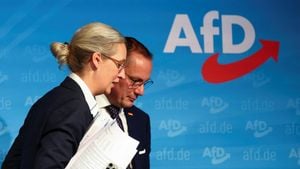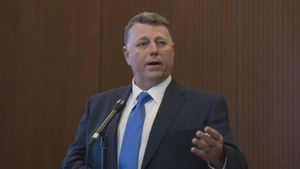Donald Trump is back in the spotlight, intertwining his post-presidency activities with both the world of golf and significant political maneuvers.
Recently, Trump has heightened his involvement in professional golf's peace talks, bringing high-profile figures such as Tiger Woods and officials from the PGA Tour to the White House. This surge of interest is influenced by the growing importance of Saudi Arabia’s Public Investment Fund (PIF) as it seeks to invest heavily in golf and sports franchises.
Woods, along with PGA Tour Commissioner Jay Monahan, met with Trump to discuss how fractured elite golf could unify under new sponsorship and collaboration agreements, especially following the controversial establishment of the LIV Tour. Woods expressed optimism about the future of the game, stating, “Things are going to heal quickly,” pointing to the potential for reconciliation between traditional and new golf entities.
Meanwhile, the Senate confirmed Kash Patel as the FBI’s new director, a move fraught with tension and disagreement. The confirmation passed narrowly with 51 votes for and 49 against, indicating the sharp divisions within Congress. Democrats opposed Patel, characterizing him as unfit due to his loyalty to Trump and history of controversial remarks against the bureau.
During debates leading up to Patel’s confirmation, Republican supporters argued he is the right person to overhaul what they view as a politicized agency. Proponents of Patel's appointment emphasized the changes needed within the FBI and his commitment to reform. "Kash Patel is the right person to transform the FBI," many Republicans iterated during discussions, reflecting their belief in his necessary role amid growing concerns about the agency.
Trump's recent actions not only highlight his enduring influence over GOP strategies but also reveal how he continues to maneuver his political ambitions via high-stakes negotiations and appointments. His push to unify golf under PIF investments is also mirrored by his political goals, seeking to balance power dynamics through appointments like Patel, who has openly criticized FBI ethics.
Looking beyond golf, Trump has also taken strong stances on other matters, including governance and budgeting. He voiced his opinions on federal governance structures, stating, "I think we should run it strong, run it with law and order," when discussing Washington D.C. governance. This comment encapsulates his approach to steering federal operations and addressing issues such as urban crime.
While Trump hosts events like the recent Black History Month reception at the White House, he continues to shape narratives around governance and law enforcement, partially using his persona to sway public opinion. The backlash he faces, particularly concerning Patel’s appointment, is indicative of the polarized political climate he thrives on.
Trump’s interest and influence extend deeply within the sports world as well, where he hopes to facilitate discussions around the PGA Tour and PIF. This partnership could see significant shifts within the sport, as it adapts to the realities of new funding and sponsorship models.
Critics, including members of the Democratic Party, remain skeptical about both his influence over the FBI and the disruptive impact he may have on traditional sports. For them, Patel's direct ties to Trump only reinforce fears of politicization within federal agencies meant to remain neutral.
Indeed, the cross-section between sports and politics poses intriguing questions about governance, ethics, and public perception. Trump's engagement at such levels indicates his relentless pursuit of power, continuing to shape both the political and athletic realms even after his presidency.
The overarching theme of Trump's post-presidency activity encapsulates both his ambition to retain influence and the myriad adjustments he must navigate as both golf and political landscapes evolve.
Looking toward the future, as Trump aims to solidify support within the Republican Party, his ability to merge these activities will be pivotal both to his legacy and his influence moving forward, securing his role at the helm of significant decisions impacting major American interests.



